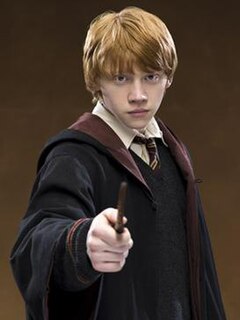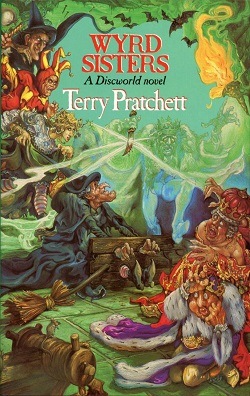
Fantastic Beasts and Where to Find Them is a 2001 guide book written by British author J. K. Rowling about the magical creatures in the Harry Potter universe. The original version, illustrated by the author herself, purports to be Harry Potter's copy of the textbook of the same name mentioned in Harry Potter and the Philosopher's Stone, the first novel of the Harry Potter series. It includes several notes inside it supposedly handwritten by Harry, Ron Weasley, and Hermione Granger, detailing their own experiences with some of the beasts described, and including in-jokes relating to the original series.

Harry Potter and the Goblet of Fire is a 2005 fantasy film directed by Mike Newell and distributed by Warner Bros. Pictures. It is based on J. K. Rowling's 2000 novel of the same name. The film, which is the fourth instalment in the Harry Potter film series, was written by Steve Kloves and produced by David Heyman. The story follows Harry's fourth year at Hogwarts as he is chosen by the Goblet of Fire to compete in the Triwizard Tournament.
An alternative universe is the occurrence of canonical facts about the setting or characterization of a particular fictional universe being explored in a non-canonical way. These universes are often made unofficially, though elements of fan fiction are sometimes used in official, though usually non-canonical, storylines.
A goblin is a legendary creature, related to gnomes or elves.

Harry Potter and the Goblet of Fire: Original Motion Picture Soundtrack was released on 15 November 2005. The film's score was not composed by John Williams as were the previous three films, but by Patrick Doyle. This was done because Williams reported having certain schedule problems, as he scored music for 2005's Star Wars: Episode III – Revenge of the Sith, Memoirs of a Geisha, Munich, and Steven Spielberg's remake of War of the Worlds.
Order of the Phoenix may refer to:
Harry Potter is a series of fantasy novels by J. K. Rowling.
Since first coming to wide notice in the late 1990s, the Harry Potter book series by J. K. Rowling has engendered a number of legal disputes. Rowling, her various publishers and Time Warner, the owner of the rights to the Harry Potter films, have taken numerous legal actions to protect their copyrights, and also have fielded accusations of copyright theft themselves. The worldwide popularity of the Harry Potter series has led to the appearance of a number of locally produced, unauthorised sequels and other derivative works, sparking efforts to ban or contain them. While these legal proceedings have countered a number of cases of outright piracy, other attempts have targeted not-for-profit endeavours and have been criticised.

Harry and the Potters are an American wizard rock band formed in Norwood, Massachusetts in 2002 by brothers Joe and Paul DeGeorge. They have released three studio albums, three singles, three extended plays, four other albums, five miscellaneous releases and two side projects. All material has been released by the independent record label Eskimo Laboratories which the duo founded.

The Three Witches, also known as the Weird Sisters or Wayward Sisters, are characters in William Shakespeare's play Macbeth. They hold a striking resemblance to the three Fates of classical mythology, and are, perhaps, intended as a twisted version of the white-robed incarnations of destiny. The witches eventually lead Macbeth to his demise. Their origin lies in Holinshed's Chronicles (1587), a history of England, Scotland and Ireland. Other possible sources, aside from Shakespeare's imagination, include British folklore, such contemporary treatises on witchcraft as King James VI of Scotland's Daemonologie, the Norns of Norse mythology, and ancient classical myths of the Fates: the Greek Moirai and the Roman Parcae. Productions of Macbeth began incorporating portions of Thomas Middleton's contemporaneous play The Witchcirca 1618, two years after Shakespeare's death.
Harry Potter is a series of novels written by J. K. Rowling.

Ronald Bilius Weasley is a fictional character in J. K. Rowling's Harry Potter series. His first appearance was in the first book of the series, Harry Potter and the Philosopher's Stone, as the best friend of Harry Potter and Hermione Granger. He is a member of the Weasley family, a pure blood family, who reside in "The Burrow" outside Ottery St. Catchpole. Along with Harry and Hermione, he is a member of the Gryffindor house. Ron is present in most of the action throughout the series.

The Magical Worlds of Harry Potter: A Treasury of Myths, Legends, and Fascinating Facts is a guide to the fictional Harry Potter universe, written by David Colbert. It explores the references to history, legends, and literature in J.K. Rowling's Harry Potter novels. Colbert conceived the idea for The Magical Worlds of Harry Potter while quizzing his nephew and nieces about the mythological references in the novels. He later wrote the book while teaching a seminar on self-publishing to graduate students at the University of North Carolina. The book was published in March 2001, without approval from Rowling, and has since received positive reviews from critics. An updated version of The Magical Worlds of Harry Potter was published in 2004 by Berkley Books.
This page is based on this
Wikipedia article Text is available under the
CC BY-SA 4.0 license; additional terms may apply.
Images, videos and audio are available under their respective licenses.









